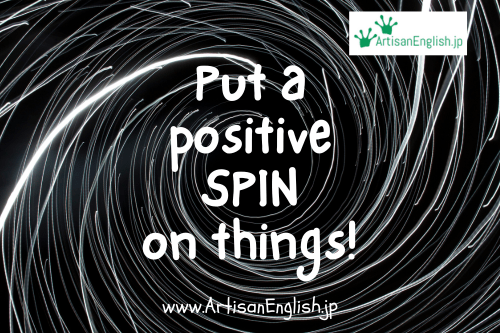
YouTube / iTunes / Spotify / Radio Public / Pocket Casts / Google Podcasts / Breaker / Overcast
Listen to ArtisanEnglish.jp posts & lesson intros here.
Word of the Day: Spin
In the world of public relations, spin is like a magician’s sleight of hand, a powerful tool politicians and corporations use to shape public perception.
Spin is the art of deliberately manipulating information to present it in the most favourable light, often to influence public opinion or media coverage.
It’s a strategic communication tactic aimed at framing an issue or an event in a way that benefits the individual or organization behind it.
One recent example of spin in action is a leading tech (I won’t name names) company’s response to a data privacy scandal.
The company’s PR team launched a spin campaign to downplay the severity of the breach and highlight the measures being taken to address the issue.
Through carefully crafted statements and media appearances, hired spin doctors tried to spin the narrative in their favour by emphasizing their commitment to user privacy and data security.
Politicians are also adept at using spin to their advantage.
Pretty much every time a Japanese politician speaks, within an hour, a spin doctor walks back what they said while trying to put a positive spin on it.
In today’s media landscape, spin has become ubiquitous in shaping public discourse.
Whether it’s deflecting negative publicity, promoting a new initiative, or responding to a crisis, spin is a go-to strategy for those in the public eye.
However, it’s crucial to understand that while spin can be an effective PR tool, its misuse can lead to a loss of trust and credibility.
If not employed transparently and ethically, spin can backfire, leading to public backlash and skepticism.
Flesch-Kincaid Readability Test
This post is understandable by someone with at least a 10th-grade education (age 16).
On the Flesch-Kincaid reading-ease test, this post scores 47.
The easier a passage is to read, the higher the score on a scale of 0 – 100.

